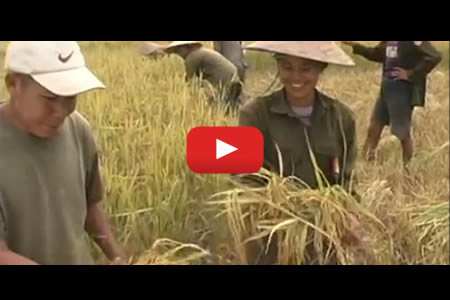|
Method
|
Description
|
Advantages
|
Disadvantages
|
|
1. Manual reaping and threshing
|
- Cutting, stacking, bundling, handling and piling by hand
- Threshing by beating
- Cleaning by winnowing
|
- Efficient
- Most effective in lodged crop
- Winnowing/cleaning necessary
- Less weather dependent
|
- High labor cost· Skill dependent
- Susceptible to grain damage
|
|
2. Manual reaping and threshing by machine
|
- Cutting and stacking by hand
- Threshing by machine
- Cleaning by machine or by hand
|
- More effective in wet season harvest-wet crop conditions
- Higher capacity than manual
- Lower labor requirements
- Less dependent on field size
|
- Higher capital cost
- Dependency on the availability of contractor
|
|
3. Reaping and threshing by machine
4. Stripper harvesting and threshing by machine
|
- Reaping by machine
- Threshing by machine
- Cleaning by machine or hand
|
- Higher capacity than manual
- Lower labor requirements
- Less dependent on field size
|
- Higher capital cost
- Dependency on the availability of contractor
|
|
5. Combine harvesting
|
|
Standard Combine-harvester
|
- Harvesting, threshing, and crop cleaning are done mechanically
- Cutter-bar cuts crop, while conveying system feeds crop into the threshing and cleaning systems
- Threshing drum tip speed ranges from 20 to 25 m/s
|
- High throughput; timeliness
- Produces Clean grain
- Spread straw back in the field
- Multi-crop ability (often used for wheat)
|
- Higher Cost
- More straw left behind in the field
- Less effective in partially lodged crop
- Can not be used for Basmati rice
|
|
Combine-harvester with stripper-header
|
- Same as above except a stripper header is used instead of a cutterbar
|
- Highest throughput
- Less power required for subsequent threshing and cleaning operations
- Can start threshing earlier in the day
|
- High Cost
- Not suited for small, muddy Asian fields
- Problems in lodged crop
|
|
Head-Feed Combine
|
- Cutterbar cuts crop, conveying system "holds" on to the straw and feeds only the panicles into the thresher
- Threshing drum tip speed 15 m/s
|
- High mobility
- Can operate in small fields
- Less power required for threshing/cleaning · Ideal for hard-to-thresh varieties
- Straw cutting/chopping is easier
|
- High Cost
- Low throughput
- Pick-up reel not suited for indica and other high-shattering varieties
- Complex machine
|
|
Axial Flow combine
|
- Similar to Conventional combine harvester, except an axial flow type thresher is used.
|
- High Throughput
- Axial-flow threshing system ideal for tropical conditions
- Works with Basmati rice
|
|







